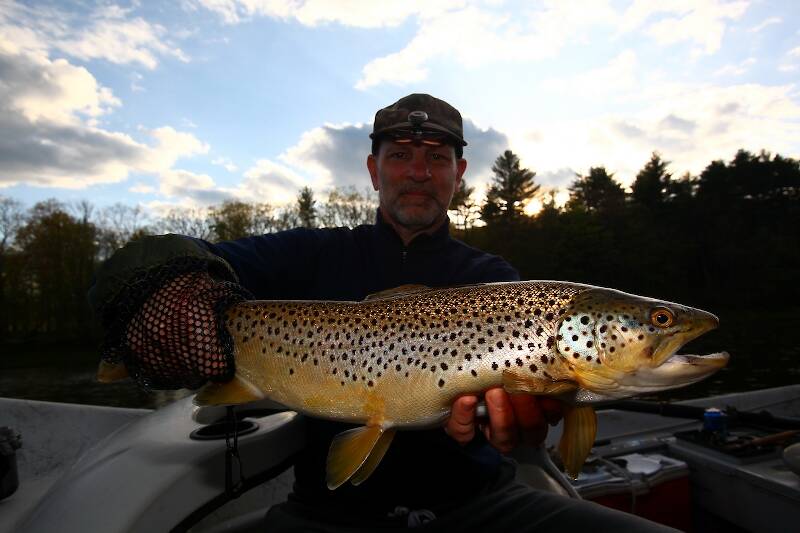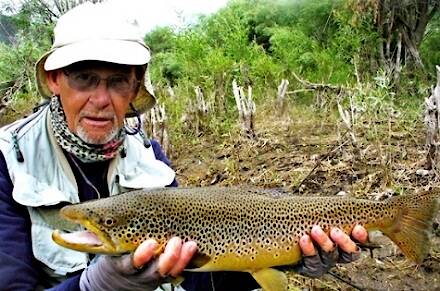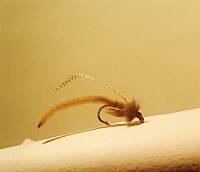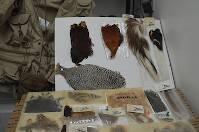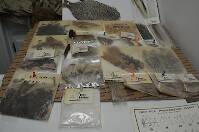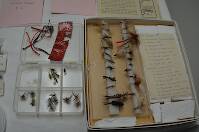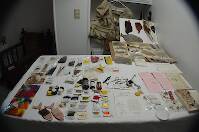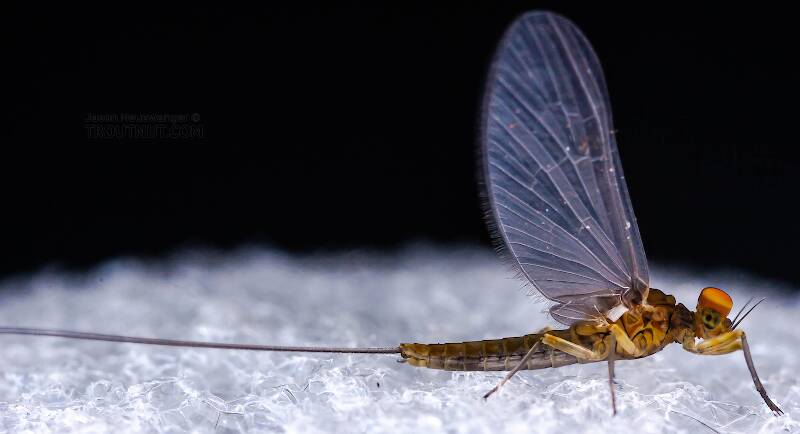
Blue-winged Olives
Baetis
Tiny Baetis mayflies are perhaps the most commonly encountered and imitated by anglers on all American trout streams due to their great abundance, widespread distribution, and trout-friendly emergence habits.
Featured on the forum
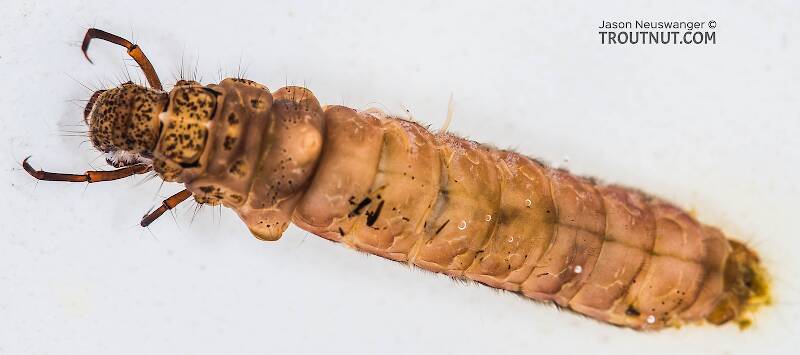
This specimen appears to be of the same species as this one collected in the same spot two months earlier. The identification of both is tentative. This one suffered some physical damage before being photographed, too, so the colors aren't totally natural. I was mostly photographing it to test out some new camera setting idea, which worked really well for a couple of closeups.

Troutnut is a project started in 2003 by salmonid ecologist Jason "Troutnut" Neuswanger to help anglers and
fly tyers unabashedly embrace the entomological side of the sport. Learn more about Troutnut or
support the project for an enhanced experience here.
LittleJ on Mar 16, 2008March 16th, 2008, 2:45 am EDT
louis, I would like it if you would allow me to include that tutorial in my new book "advanced fly tying for dummies". Right now i've got the walts worm, muskrat nymph, pre made globug, and everybodys favorite, coffee bean pellet fly. I started on the zebra midge but then decided I should set the cap on the number of steps at 1.
Thanks in advance
Jeff
Thanks in advance
Jeff
Shawnny3 on Mar 16, 2008March 16th, 2008, 3:53 am EDT
Fur, feathers, plastic, metal, are all valid ingredients so far as I'm concerned...
You forgot that noble material that can be used by the tier of great skill to supplant all others: Foam.
This has been a really good thread - I wish I'd been reading it all along. My favorite quotes:
Or worms...
But, so as not to violate another essential element of the fly-fishing tradition, the rocks would have to be quarried in England and cost $300 each."
I would even suggest tying them on treblehooks and marinating the yarn flies in worm juice.
The dry fly fishing has been slow, and I to was looking for a rise:)
For those advanced tiers who dare venture into such layered and detailed procedures and recipes, I will attempt to explain how to tie these distinct and species-specific flies.
Good stuff, guys. Keep it coming.
-Shawn
Jewelry-Quality Artistic Salmon Flies, by Shawn Davis
www.davisflydesigns.com
www.davisflydesigns.com
Lastchance on Apr 20, 2008April 20th, 2008, 11:56 am EDT
If we were all truly purists we wouldn't use hooks, synthetic thread, vises, factory made lines, lead shot, tin shot, anything plastic, genetically engineered feathers, dubbing in a bag, etc. etc. etc. The only thing genuine about fly fishing anymore is beer--and thank God for that.
Martinlf on Apr 21, 2008April 21st, 2008, 5:45 am EDT
Hey Lastchance, my in-laws are in Johnstown and Hastings, so I'm up that way from time to time. I just met my brother-in-law on the Little Juniata for some fishing, and hope to get up your way next weekend. I don't mind a trip to the in-laws one bit as my brother-in-law tells his wife he has to keep his in-law (me) entertained and show some hospitality by taking me out fishing. We think it's a great scam; neither of our wives feels comfortable objecting.
"He spread them a yard and a half. 'And every one that got away is this big.'"
--Fred Chappell
--Fred Chappell
Troutbum13 on Sep 5, 2008September 5th, 2008, 9:34 am EDT
Guys take it easy! Let people use what they want without getting too opinionated. Flyfishing is supposed to be fun,right? So go out and have fun! A fly is a fly, hook & material wrapped on a hook. Dont get all hung up on all that purist mumbo jumbo! Fishing will always be fishing, it's not rocket science.
Martinlf on Sep 6, 2008September 6th, 2008, 3:02 pm EDT
It's all in good fun. Most of us know each other and like to tease a bit.
"He spread them a yard and a half. 'And every one that got away is this big.'"
--Fred Chappell
--Fred Chappell
Troutbum13 on Sep 7, 2008September 7th, 2008, 12:41 am EDT
I see, I'm new to the forum. Teasing your fishin buddies is part of fly fishing!
Martinlf on Sep 7, 2008September 7th, 2008, 6:28 am EDT
Good to have you here!
"He spread them a yard and a half. 'And every one that got away is this big.'"
--Fred Chappell
--Fred Chappell
Troutbum13 on Sep 7, 2008September 7th, 2008, 11:30 am EDT
Thank you. Good to be on board! Hope to bring something to the forum,not sure what yet, but hope to learn alittle something or give a little advice or share a few fishing stories with everyone!
Kennedy
Posts: 1
Posts: 1
Kennedy on Dec 22, 2008December 22nd, 2008, 8:18 am EST
Twas before Christmas and I was looking for a place to order honey bug material when I came across this discussion. The things have been in my fly box since I was 10, which would make it 34 years and counting. Also, the material makes a great sucker spawn. But my reply is prompted by a desire to comment on a few of the other comments and spread the gospel of Paul Berger.
Regarding the old kits Mr. Berger (of Trout Run, Pa., if memory serves) used to sell. They came in a little clear plastic box about the size of an index card, and about an inch deep. They included everything: hooks, some white floss, instructions and, of course, a relatively small sampling of Mr. Berger's infamous invention, honey bug chenille. The directions instructed that what was needed for a size 12 bug was a six-inch length of the appropriate thickness of chenille (it comes in what I call regular, thick and thin; regular would be the stuff for a size 12). Strip off about half of the fuzz to expose the four inner cotton strands. Remove one of the four strands and then tie the remaining three, starting at the bend, as you would the thread for a standard fly. Wrap the chenille on the hook, ending near the eye, and tie it all off with a piece of floss. My dad and I always presumed this was a way to get you to use more material as six inches is enough for at least two bugs using standard tying methods and white thread. But Mr. Berger was something to watch when he tied the bugs himself. Using the method outlined in his kit, he could pump out a bug about every 30 seconds, and they looked as tight and well constructed as any fly you could buy in those days. I had the good fortune to see him at work at the Harrisburg outdoors show (in the Cow Palace) at a time when he was shilling his latest addition to the honey bug invention: two and three-colored bugs. Two colored would be the color of the chenille, with the belly turned lighter by swabbing it with a needle's eye full of bleach. Don't use too much, though, or you'd just bleach out the whole bug. He had devised a special formulation so the bug wouldn't bleach out to pure white, but a cream or off white. Tri color bugs started out with a kind of spotted chenille and their bellies would be similarly bleached to add the third color. Mr. Berger had, I recall, a light bulb in a wooden box with a screen on top for drying his freshly bleached bugs. The 11-year-old version of me that tried this at home made an adult-sized mess. Plus, the caustic soda in the bleach tends to rust hooks prematurely, resulting in too many lost fish.
That's OK, they're deadly enough without the fancy bleaching. In those days, I presumed it was simply that most of the fish I pursued were fresh out of the hatchery and poop on a stick would have worked every bit as well as cotton chenille on a hook. But as I got into my early teens and found the honey bug to be my fall back fly, I found it worked just as well on wild trout as on hatchery fish. And stocked trout that had become well educated fell prey to it fairly easily. Similarly, you can catch bass and sunnies on them as well. When I looked for a reason by submerging true honey bugs and similar flies made with synthetic chenille (of, say, the green weenie variety) I made a shocking discovery. Though the cotton chenille looks drab and ordinary when it's dry, or even when its wet but out of water, when it's submerged, it takes on a translucent quality, much like you see when you look at a squirming grub or maggot, a fresh salmon egg (not those pickled ones in the Uncle Josh's jars) or even a chunk of raw chicken meat. In other words, the stuff, either on purpose or by accident, has the look of living flesh when it's under water. By contrast, the chenille used for green weenies doesn't look nearly as good under water as it does when it's dry.
Thus, over the years, my dad and I began making not only regular honey bugs, but also sucker spawn using the thin variety of honey bug material. Pooh-pooh these if you will, but suckers, carp, gizzard shad and any number of other fish are spewing their hopes for a new generation all over most streams and rivers of the east coast each spring, and trout are very fond of fish eggs. And I'm not just talking about rainbows. Brooks and browns like them just as well as their west coast cousins. Similarly, when we started going salmon fishing in the Great Lakes tributaries a few years back, our trusty honey bug sucker spawn proved to be a consistent producer (and yes, angry spawning salmon do strike flies, even though they're not feeding, just like hopped-up shad pounce on darts and spoons when they're spawning and not thinking of food).
In any event, E. Hille Anglers' Supply still stocks a sampling of the stuff, but if anyone knows who has Mr. Berger's old franchise — I understand it's changed hands at least three times in recent years — please let me know.
jk
Regarding the old kits Mr. Berger (of Trout Run, Pa., if memory serves) used to sell. They came in a little clear plastic box about the size of an index card, and about an inch deep. They included everything: hooks, some white floss, instructions and, of course, a relatively small sampling of Mr. Berger's infamous invention, honey bug chenille. The directions instructed that what was needed for a size 12 bug was a six-inch length of the appropriate thickness of chenille (it comes in what I call regular, thick and thin; regular would be the stuff for a size 12). Strip off about half of the fuzz to expose the four inner cotton strands. Remove one of the four strands and then tie the remaining three, starting at the bend, as you would the thread for a standard fly. Wrap the chenille on the hook, ending near the eye, and tie it all off with a piece of floss. My dad and I always presumed this was a way to get you to use more material as six inches is enough for at least two bugs using standard tying methods and white thread. But Mr. Berger was something to watch when he tied the bugs himself. Using the method outlined in his kit, he could pump out a bug about every 30 seconds, and they looked as tight and well constructed as any fly you could buy in those days. I had the good fortune to see him at work at the Harrisburg outdoors show (in the Cow Palace) at a time when he was shilling his latest addition to the honey bug invention: two and three-colored bugs. Two colored would be the color of the chenille, with the belly turned lighter by swabbing it with a needle's eye full of bleach. Don't use too much, though, or you'd just bleach out the whole bug. He had devised a special formulation so the bug wouldn't bleach out to pure white, but a cream or off white. Tri color bugs started out with a kind of spotted chenille and their bellies would be similarly bleached to add the third color. Mr. Berger had, I recall, a light bulb in a wooden box with a screen on top for drying his freshly bleached bugs. The 11-year-old version of me that tried this at home made an adult-sized mess. Plus, the caustic soda in the bleach tends to rust hooks prematurely, resulting in too many lost fish.
That's OK, they're deadly enough without the fancy bleaching. In those days, I presumed it was simply that most of the fish I pursued were fresh out of the hatchery and poop on a stick would have worked every bit as well as cotton chenille on a hook. But as I got into my early teens and found the honey bug to be my fall back fly, I found it worked just as well on wild trout as on hatchery fish. And stocked trout that had become well educated fell prey to it fairly easily. Similarly, you can catch bass and sunnies on them as well. When I looked for a reason by submerging true honey bugs and similar flies made with synthetic chenille (of, say, the green weenie variety) I made a shocking discovery. Though the cotton chenille looks drab and ordinary when it's dry, or even when its wet but out of water, when it's submerged, it takes on a translucent quality, much like you see when you look at a squirming grub or maggot, a fresh salmon egg (not those pickled ones in the Uncle Josh's jars) or even a chunk of raw chicken meat. In other words, the stuff, either on purpose or by accident, has the look of living flesh when it's under water. By contrast, the chenille used for green weenies doesn't look nearly as good under water as it does when it's dry.
Thus, over the years, my dad and I began making not only regular honey bugs, but also sucker spawn using the thin variety of honey bug material. Pooh-pooh these if you will, but suckers, carp, gizzard shad and any number of other fish are spewing their hopes for a new generation all over most streams and rivers of the east coast each spring, and trout are very fond of fish eggs. And I'm not just talking about rainbows. Brooks and browns like them just as well as their west coast cousins. Similarly, when we started going salmon fishing in the Great Lakes tributaries a few years back, our trusty honey bug sucker spawn proved to be a consistent producer (and yes, angry spawning salmon do strike flies, even though they're not feeding, just like hopped-up shad pounce on darts and spoons when they're spawning and not thinking of food).
In any event, E. Hille Anglers' Supply still stocks a sampling of the stuff, but if anyone knows who has Mr. Berger's old franchise — I understand it's changed hands at least three times in recent years — please let me know.
jk
Martinlf on Dec 22, 2008December 22nd, 2008, 2:43 pm EST
Hi JK, I've been trying to track down the franchise for a while. I did find some reasonably good substitutes, but nothing that is exactly the same. I note that E.Hille has been selling some of the substitute yarns in some colors (i.e. their insect green). The Little Lehigh Flyshop seems to have found a source. Rod dyes up yards of the stuff into a color he calls inchworm green, but I haven't had the stones to ask him where he gets the yarn.
"He spread them a yard and a half. 'And every one that got away is this big.'"
--Fred Chappell
--Fred Chappell
LittleJ on Dec 22, 2008December 22nd, 2008, 2:59 pm EST
cool story jk, i've become a big fan of the honey bug this year.(better late than never). Just goes to show how far behind "modern" trends are, Mr. Berger was apparently on to the "hot spot" idea 30+ years ago.
jeff
jeff
Sandfly on Dec 29, 2008December 29th, 2008, 5:59 am EST
Any one looking for the real Honey Bug material can check out my web site. I am the only dealer left with the origanal stuff. Al others are a copy, I carry all the colors and 2 sizes. Once this is gone its gone for good. No one makes this material..
sandfly
shop owner
N.J.B.B.A. #2215
Tiadaughton T.U. 688
I didn't Escape------They gave me a day pass !
shop owner
N.J.B.B.A. #2215
Tiadaughton T.U. 688
I didn't Escape------They gave me a day pass !
JAD on Dec 29, 2008December 29th, 2008, 12:26 pm EST
And what would that web site be.
JAD
JAD
They fasten red (crimson red) wool around a hook, and fix onto the wool two feathers which grow under a cock’s wattles, and which in colour are like wax.
Radcliffe's Fishing from the Earliest Times,
Taxon on Dec 29, 2008December 29th, 2008, 1:30 pm EST
John-
I assume sandfly is Bob Childs, and he may be reluctant to overtly advertise on Jason's site. However, given the context on this particular discussion, I really doubt Jason would have a problem with it.
The link to the Honey Bug materials is http://www.bigmeadowsflyshop.com/Store.html and they appear at the bottom of the screen.
And what would that web site be?
I assume sandfly is Bob Childs, and he may be reluctant to overtly advertise on Jason's site. However, given the context on this particular discussion, I really doubt Jason would have a problem with it.
The link to the Honey Bug materials is http://www.bigmeadowsflyshop.com/Store.html and they appear at the bottom of the screen.
RogerA on Feb 16, 2009February 16th, 2009, 6:29 am EST
I've used the Honey Bug pattern for years. The pattern is currently owned by Pat O'Brian, located in Connellesville, PA. Also, one of the best fly fisherman I've fished with. It is not chenille, but a cotton yarn that is used. Very difficult to find. Pat has complained about the problem of finding material. I'm running out myself. The Honey Bug is my go to under water fly. I've caught more trout in PA & Wv & Maryland with the Honey Bug than with any other under water fly. I've got no explanation why. All it is is this cotton yard rapped backwards down the hook to the butt end. Works like a charm though.
Seregreb on Mar 28, 2009March 28th, 2009, 1:18 pm EDT
The secret is in how you dye the material. The dye is made of natural resources.You are right,The honey bug material is gone, as we know it. I Have a nice supply of tied bug's, Some material and a lot of knowledge on how to fish them. Paul was my Grandfather. He showed me how to fish em and make em. need some bug's email me. Steve Berger
Wbranch on Mar 28, 2009March 28th, 2009, 11:35 pm EDT
What's a Honey Bug? A relative to the Green Weenie? Or some other PA non-fly?
Catskill fly fisher for fifty-five years.
Sandfly on Mar 31, 2009March 31st, 2009, 12:08 pm EDT
read my previous posts
sandfly
shop owner
N.J.B.B.A. #2215
Tiadaughton T.U. 688
I didn't Escape------They gave me a day pass !
shop owner
N.J.B.B.A. #2215
Tiadaughton T.U. 688
I didn't Escape------They gave me a day pass !
Quick Reply
Related Discussions
Topic
Replies
Last Reply
Re: Three Trouble Makers at the Midwest Fly Fishing Expo the past weekend
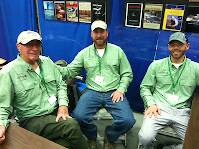
In the Photography Board by Oldredbarn

In the Photography Board by Oldredbarn
3
Mar 11, 2014
by TNEAL
by TNEAL
5
Mar 5, 2018
by Wbranch
by Wbranch
7
May 29, 2012
by Possumpoint
by Possumpoint


